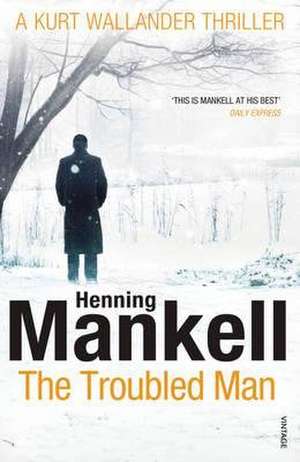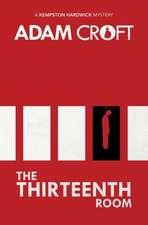The Troubled Man: Kurt Wallander
Autor Henning Mankell Traducere de Laurie Thompsonen Limba Engleză Paperback – 16 feb 2012
| Toate formatele și edițiile | Preț | Express |
|---|---|---|
| Paperback (2) | 60.81 lei 25-31 zile | +24.89 lei 6-12 zile |
| Vintage Publishing – 16 feb 2012 | 60.81 lei 25-31 zile | +24.89 lei 6-12 zile |
| Vintage Crime/Black Lizard – 31 mar 2012 | 128.00 lei 22-36 zile |
Din seria Kurt Wallander
- 16%
 Preț: 53.36 lei
Preț: 53.36 lei - 14%
 Preț: 61.80 lei
Preț: 61.80 lei -
 Preț: 109.17 lei
Preț: 109.17 lei -
 Preț: 88.41 lei
Preț: 88.41 lei - 14%
 Preț: 62.12 lei
Preț: 62.12 lei - 14%
 Preț: 61.08 lei
Preț: 61.08 lei - 14%
 Preț: 61.25 lei
Preț: 61.25 lei - 16%
 Preț: 53.99 lei
Preț: 53.99 lei - 15%
 Preț: 55.26 lei
Preț: 55.26 lei - 21%
 Preț: 56.57 lei
Preț: 56.57 lei - 14%
 Preț: 55.88 lei
Preț: 55.88 lei -
 Preț: 80.64 lei
Preț: 80.64 lei -
 Preț: 87.83 lei
Preț: 87.83 lei -
 Preț: 78.81 lei
Preț: 78.81 lei -
 Preț: 104.33 lei
Preț: 104.33 lei -
 Preț: 95.93 lei
Preț: 95.93 lei -
 Preț: 97.25 lei
Preț: 97.25 lei -
 Preț: 56.39 lei
Preț: 56.39 lei -
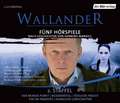 Preț: 177.07 lei
Preț: 177.07 lei -
 Preț: 163.83 lei
Preț: 163.83 lei -
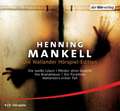 Preț: 199.93 lei
Preț: 199.93 lei -
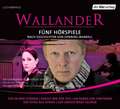 Preț: 141.67 lei
Preț: 141.67 lei
Preț: 60.81 lei
Preț vechi: 71.12 lei
-14% Nou
Puncte Express: 91
Preț estimativ în valută:
11.64€ • 12.65$ • 9.78£
11.64€ • 12.65$ • 9.78£
Carte disponibilă
Livrare economică 03-09 aprilie
Livrare express 15-21 martie pentru 34.88 lei
Preluare comenzi: 021 569.72.76
Specificații
ISBN-13: 9780099548409
ISBN-10: 0099548402
Pagini: 512
Dimensiuni: 131 x 204 x 35 mm
Greutate: 0.35 kg
Editura: Vintage Publishing
Seria Kurt Wallander
ISBN-10: 0099548402
Pagini: 512
Dimensiuni: 131 x 204 x 35 mm
Greutate: 0.35 kg
Editura: Vintage Publishing
Seria Kurt Wallander
Notă biografică
Henning Mankell’s novels have been translated into forty languages and have sold more than thirty million copies worldwide. He is the first winner of the Ripper Award (the new European prize for crime fiction) and has also received the Glass Key and Golden Dagger awards. His Kurt Wallander mysteries were adapted into a PBS television series starring Kenneth Branagh. Mankell divides his time between Sweden and Mozambique.
www.henningmankell.com
www.henningmankell.com
Extras
1
The year Kurt Wallander celebrated his fifty-fifth birthday, he fulfilled a long-held dream. Ever since his divorce from Mona fifteen years earlier, he had intended to leave his apartment in Mariagatan, where so many unpleasant memories were etched into the walls, and move out to the country. Every time he came home in the evening after a stressful and depressing workday, he was reminded that once upon a time he had lived there with a family. Now the furniture stared at him as if accusing him of desertion.
He could never reconcile himself to living there until he became so old that he might not be able to look after himself anymore. Although he had not yet reached the age of sixty, he reminded himself over and over again of his father's lonely old age, and he knew he had no desire to follow in his footsteps. He needed only to look into the bathroom mirror in the morning when he was shaving to see that he was growing more and more like his father. When he was young, his face had resembled his mother's. But now it seemed as if his father was taking him over-like a runner who has been lagging a long way behind but is slowly catching up the closer he gets to the invisible finish line.
Wallander's worldview was fairly simple. He did not want to become a bitter hermit growing old in isolation, being visited only by his daughter and perhaps now and then by a former colleague who had suddenly remembered that Wallander was still alive. He had no religious hopes of there being something in store for him on the other side of the black River Styx. There would be nothing but the same darkness that he had once emerged from. Until his fiftieth birthday, he had harbored a vague fear of death, something that had become his own personal mantra-that he would be dead for such a long time. He had seen far too many dead bodies in his life. There was nothing in their expressionless faces to suggest that their souls had been absorbed into some kind of heaven. Like so many other police officers, he had experienced every possible variation of death. Just after his fiftieth birthday had been celebrated with a party and cake at the police station, marked by a speech full of empty phrases by the former chief of police, Liza Holgersson, he had bought a new notebook and tried to record his memories of all the dead people he had come across. It had been a macabre exercise and he had no idea why he had been tempted to pursue it. When he got as far as the tenth suicide, a man in his forties, a drug addict with more or less every problem it was possible to imagine, he gave up. The man had hanged himself in the attic of the condemned apartment building where he lived, hanging in such a way that he was guaranteed to break his neck and hence avoid being slowly choked to death. His name was Welin. The pathologist had told Wallander that the man had been successful-he had proved to be a skillful executioner. At that point Wallander had abandoned his suicide cases and instead stupidly devoted several hours to an attempt to recall the young people or children he had found dead. But he soon gave that up as well. It was too repugnant. Then he felt ashamed of what he had been trying to do and burned the notebook, as if his efforts were both perverted and illegal. In fact, he was basically a cheerful person-it was just that he had allowed another side of his personality to take over.
Death had been his constant companion. He had killed people in the line of duty-but after the obligatory investigation he had never been accused of unnecessary violence.
Having killed two people was the cross he had to bear. If he rarely laughed, it was because of what he had been forced to endure.
But one day he made a critical decision. He had been out near Löderup, not far from the house where his father used to live, to talk to a farmer who had been the target of a very nasty robbery. On the way back to Ystad he noticed a real estate agent's sign picturing a little dirt road where there was a house for sale. He reacted automatically, stopped the car, turned around, and found his way to the address. Even before he got out of the car it was obvious to him that the property was in need of repair. It had originally been a U-shaped building, the bottom half clad in wood. But now one of the wings was missing-perhaps it had burned down. He walked around the house. It was a day in early fall. He could still remember seeing a skein of geese migrating south, flying directly above his head. He peered in through the windows and soon established that only the roof badly needed to be fixed. The view was enchanting; he could just make out the sea in the far distance, and possibly even one of the ferries on the way to Ystad from Poland. That afternoon in September 2003 marked the beginning of a love story with this remote house.
He drove straight to the real estate agent's office in the center of Ystad. The asking price was low enough that he would be able to manage the mortgage payments. The very next day he returned to negotiate with the agent, a young man who spoke at breakneck speed and gave the impression of living in a parallel universe. The previous owners were a young couple who had moved to Skåne from Stockholm but almost immediately, before they even had time to buy furniture, decided to split up. Yet there was nothing hidden in the walls of the empty house that scared him. And the most important thing was crystal clear: he would be able to move in without delay. The roof would last for another year or two; all he needed to do was to redecorate some of the rooms, perhaps install a new bath and maybe acquire a new stove. But the boiler was less than fifteen years old, and all the plumbing and electrical fittings no older.
Before leaving, Wallander asked if there were any other potential buyers. There was one, said the agent, looking distinctly worried, as if he really wanted Wallander to get the house but at the same time implying that he had better make his mind up fast. But Wallander had no intention of rushing in blindly. He spoke to one of his colleagues whose brother was a home inspector and managed to arrange for the expert to inspect the house the very next day. He found nothing wrong apart from what Wallander had already noticed. That same day Wallander spoke to his bank manager and was informed that he could rely on a mortgage big enough to buy the house. During all his years in Ystad, Wallander had saved up a lot of money without ever thinking much about it. Enough for the down payment.
That evening he sat at his kitchen table and made detailed financial calculations. He found the occasion solemn and significant. By midnight he had made up his mind: he would buy the house, which had the dramatic-sounding name of Black Heights. Despite the late hour, he called his daughter, Linda, who lived in a new development just off the main road to Malmö. She was still awake.
"You must come over," said Wallander excitedly. "I've got news for you."
"What? In the middle of the night?"
"I know it's your day off tomorrow."
It had been a complete surprise to him a few years earlier when, during a walk along the beach at Mossby Strand, Linda told him she had decided to follow in his footsteps and join the police force. It cheered him up instantly. In a way it was as if she was giving new meaning to all the years he had been a police officer. When she finished her training, she was assigned to the Ystad force. The first few months, she lived with him in the apartment in Mariagatan. It was not an ideal arrangement; he was set in his ways, and he also found it hard to accept that she was grown up now. But their relationship was saved when she managed to find an apartment of her own.
When she arrived in the early hours, he told her what he was planning to do. The next day she accompanied him to the house and said immediately that it was perfect. No other house would do, only this one at the end of a dirt road at the top of a gentle slope down to the sea.
"Granddad will haunt you," she said. "But you don't need to be afraid. He'll be a sort of guardian angel."
It was a significant and happy moment in Wallander's life when he signed the contract of sale and suddenly found himself standing there with a bunch of keys in his hand. He moved in on November first, having redecorated two rooms but having refrained from buying a new stove. He left Mariagatan without the slightest doubt that he was doing the right thing. A southeasterly gale was blowing the day he moved in.
That first evening, with the storm raging, he lost electricity. Wallander sat in his new home in pitch darkness. There was groaning and creaking coming from the rafters, and he discovered a leak in the ceiling. But he had no regrets. This was where he was going to live.
There was a dog kennel outside the house. Ever since he was a little boy Wallander had dreamed of having a dog. By the time he was thirteen he had given up hope, but out of the blue he got one as a present from his parents. He loved that dog more than anything else in the world. Looking back, it felt like the dog, Saga, had taught him what love could be. When she was three years old, she was run over by a truck. The shock and sorrow were worse than anything he had experienced in his young life. More than forty years later, Wallander had no difficulty recalling all those chaotic emotions. Death strikes, he sometimes thought. It has a powerful and unforgiving fist.
Two weeks later he acquired a dog, a black Labrador puppy. He wasn't quite a purebred, but he was nevertheless described by the owner as top class. Wallander had decided in advance that the dog would be called Jussi, after the world-famous Swedish tenor who was one of Wallander's greatest heroes.
Nearly four years after he bought the house, on January 12, 2007, Wallander's whole life changed in an instant.
As he stepped out into the hall a few paces behind Kristina Magnusson, whom he liked viewing from behind when nobody was looking, the phone rang in his office. He considered ignoring it, but instead he turned and went back in. It was Linda. She had a few days off, having worked on New Year's Eve, during which Ystad had been unusually lively, with lots of cases of domestic violence and assaults.
"Do you have a minute?"
"Not really. We're on the verge of identifying some crooks in a big case."
"I need to see you."
Wallander thought she sounded tense. He started to worry, as he always did, that something might have happened to her.
"Is it anything serious?"
"Not at all."
"I can meet you at one o'clock."
"Mossby Strand beach?"
Wallander thought she was joking.
"Should I bring my bathing suit?"
"I'm serious. Mossby Strand. But no bathing suit."
"Why do we have to go out there in the cold with this icy wind blowing?"
"I'll be there at one o'clock. So will you."
She hung up before he could ask anything else. What did she want? He stood there, trying in vain to think of an answer. Then he went to the conference room with the best television set and sat for two hours going through CCTV camera footage for the case he was working on, the brutal attack and robbery of an elderly arms dealer and his wife. As twelve thirty approached, they were still only halfway through. Wallander stood up and announced that they could review the rest of the tapes after two o'clock. Martinsson, one of the officers Wallander had worked with longest in Ystad, looked at him in surprise.
"You mean we should stop now? With so much still to do? You don't usually break for lunch."
"I'm not going to eat. I have an appointment."
He left the room, thinking that his tone of voice had been unnecessarily sharp. He and Martinsson were not only colleagues, they were also friends. When Wallander threw his housewarming party out at Löderup it was of course Martinsson who gave a speech in praise of him, the dog, and the house. We are like an old hardworking couple, he thought as he left the police station. An old couple who are always bickering, mainly to keep each other on our toes.
He went to his car, a Peugeot he'd had for the last four years, and drove off. How many times have I driven along this road? How many more times will I drive along it? As he waited for a red light to change, he remembered something his father had told him about a cousin Wallander had never met. His cousin used to be captain of a ferry plying between several islands in the Stockholm archipelago-short trips, no more than five minutes at a time, but year in, year out, the same crossings. One afternoon in October something snapped inside him. The ferry had a full load, but he suddenly changed course and headed straight out to sea. He said later that he knew there was enough diesel in the tank to take him as far as one of the Baltic states. But that was all he said, after he was overpowered by angry passengers and the coast guard raced out to put the ferry back on course. He never explained why he did what he did.
But in a vague sort of way, Wallander thought he understood him.
As he drove west along the coast road he could see dark thunderclouds building up on the horizon. The radio had warned that there was a risk of more snow in the evening. Shortly before he passed the side road to Marsvinsholm he was overtaken by a motorcycle. The rider waved at him and made Wallander think of something that frightened him more than anything else: that one of these days Linda would have a motorcycle accident. He had been totally unprepared when, several years earlier, she turned up outside his apartment on her newly bought bike, a Harley- Davidson covered in glittering chrome. His first question when she took off her crash helmet was whether she had lost her mind.
"You don't know about all my dreams," she had said with a broad, happy grin. "Just as I'm sure I don't know all yours."
"I don't dream about a motorbike, that's for sure."
"Too bad. We could have gone for rides together."
From the Hardcover edition.
The year Kurt Wallander celebrated his fifty-fifth birthday, he fulfilled a long-held dream. Ever since his divorce from Mona fifteen years earlier, he had intended to leave his apartment in Mariagatan, where so many unpleasant memories were etched into the walls, and move out to the country. Every time he came home in the evening after a stressful and depressing workday, he was reminded that once upon a time he had lived there with a family. Now the furniture stared at him as if accusing him of desertion.
He could never reconcile himself to living there until he became so old that he might not be able to look after himself anymore. Although he had not yet reached the age of sixty, he reminded himself over and over again of his father's lonely old age, and he knew he had no desire to follow in his footsteps. He needed only to look into the bathroom mirror in the morning when he was shaving to see that he was growing more and more like his father. When he was young, his face had resembled his mother's. But now it seemed as if his father was taking him over-like a runner who has been lagging a long way behind but is slowly catching up the closer he gets to the invisible finish line.
Wallander's worldview was fairly simple. He did not want to become a bitter hermit growing old in isolation, being visited only by his daughter and perhaps now and then by a former colleague who had suddenly remembered that Wallander was still alive. He had no religious hopes of there being something in store for him on the other side of the black River Styx. There would be nothing but the same darkness that he had once emerged from. Until his fiftieth birthday, he had harbored a vague fear of death, something that had become his own personal mantra-that he would be dead for such a long time. He had seen far too many dead bodies in his life. There was nothing in their expressionless faces to suggest that their souls had been absorbed into some kind of heaven. Like so many other police officers, he had experienced every possible variation of death. Just after his fiftieth birthday had been celebrated with a party and cake at the police station, marked by a speech full of empty phrases by the former chief of police, Liza Holgersson, he had bought a new notebook and tried to record his memories of all the dead people he had come across. It had been a macabre exercise and he had no idea why he had been tempted to pursue it. When he got as far as the tenth suicide, a man in his forties, a drug addict with more or less every problem it was possible to imagine, he gave up. The man had hanged himself in the attic of the condemned apartment building where he lived, hanging in such a way that he was guaranteed to break his neck and hence avoid being slowly choked to death. His name was Welin. The pathologist had told Wallander that the man had been successful-he had proved to be a skillful executioner. At that point Wallander had abandoned his suicide cases and instead stupidly devoted several hours to an attempt to recall the young people or children he had found dead. But he soon gave that up as well. It was too repugnant. Then he felt ashamed of what he had been trying to do and burned the notebook, as if his efforts were both perverted and illegal. In fact, he was basically a cheerful person-it was just that he had allowed another side of his personality to take over.
Death had been his constant companion. He had killed people in the line of duty-but after the obligatory investigation he had never been accused of unnecessary violence.
Having killed two people was the cross he had to bear. If he rarely laughed, it was because of what he had been forced to endure.
But one day he made a critical decision. He had been out near Löderup, not far from the house where his father used to live, to talk to a farmer who had been the target of a very nasty robbery. On the way back to Ystad he noticed a real estate agent's sign picturing a little dirt road where there was a house for sale. He reacted automatically, stopped the car, turned around, and found his way to the address. Even before he got out of the car it was obvious to him that the property was in need of repair. It had originally been a U-shaped building, the bottom half clad in wood. But now one of the wings was missing-perhaps it had burned down. He walked around the house. It was a day in early fall. He could still remember seeing a skein of geese migrating south, flying directly above his head. He peered in through the windows and soon established that only the roof badly needed to be fixed. The view was enchanting; he could just make out the sea in the far distance, and possibly even one of the ferries on the way to Ystad from Poland. That afternoon in September 2003 marked the beginning of a love story with this remote house.
He drove straight to the real estate agent's office in the center of Ystad. The asking price was low enough that he would be able to manage the mortgage payments. The very next day he returned to negotiate with the agent, a young man who spoke at breakneck speed and gave the impression of living in a parallel universe. The previous owners were a young couple who had moved to Skåne from Stockholm but almost immediately, before they even had time to buy furniture, decided to split up. Yet there was nothing hidden in the walls of the empty house that scared him. And the most important thing was crystal clear: he would be able to move in without delay. The roof would last for another year or two; all he needed to do was to redecorate some of the rooms, perhaps install a new bath and maybe acquire a new stove. But the boiler was less than fifteen years old, and all the plumbing and electrical fittings no older.
Before leaving, Wallander asked if there were any other potential buyers. There was one, said the agent, looking distinctly worried, as if he really wanted Wallander to get the house but at the same time implying that he had better make his mind up fast. But Wallander had no intention of rushing in blindly. He spoke to one of his colleagues whose brother was a home inspector and managed to arrange for the expert to inspect the house the very next day. He found nothing wrong apart from what Wallander had already noticed. That same day Wallander spoke to his bank manager and was informed that he could rely on a mortgage big enough to buy the house. During all his years in Ystad, Wallander had saved up a lot of money without ever thinking much about it. Enough for the down payment.
That evening he sat at his kitchen table and made detailed financial calculations. He found the occasion solemn and significant. By midnight he had made up his mind: he would buy the house, which had the dramatic-sounding name of Black Heights. Despite the late hour, he called his daughter, Linda, who lived in a new development just off the main road to Malmö. She was still awake.
"You must come over," said Wallander excitedly. "I've got news for you."
"What? In the middle of the night?"
"I know it's your day off tomorrow."
It had been a complete surprise to him a few years earlier when, during a walk along the beach at Mossby Strand, Linda told him she had decided to follow in his footsteps and join the police force. It cheered him up instantly. In a way it was as if she was giving new meaning to all the years he had been a police officer. When she finished her training, she was assigned to the Ystad force. The first few months, she lived with him in the apartment in Mariagatan. It was not an ideal arrangement; he was set in his ways, and he also found it hard to accept that she was grown up now. But their relationship was saved when she managed to find an apartment of her own.
When she arrived in the early hours, he told her what he was planning to do. The next day she accompanied him to the house and said immediately that it was perfect. No other house would do, only this one at the end of a dirt road at the top of a gentle slope down to the sea.
"Granddad will haunt you," she said. "But you don't need to be afraid. He'll be a sort of guardian angel."
It was a significant and happy moment in Wallander's life when he signed the contract of sale and suddenly found himself standing there with a bunch of keys in his hand. He moved in on November first, having redecorated two rooms but having refrained from buying a new stove. He left Mariagatan without the slightest doubt that he was doing the right thing. A southeasterly gale was blowing the day he moved in.
That first evening, with the storm raging, he lost electricity. Wallander sat in his new home in pitch darkness. There was groaning and creaking coming from the rafters, and he discovered a leak in the ceiling. But he had no regrets. This was where he was going to live.
There was a dog kennel outside the house. Ever since he was a little boy Wallander had dreamed of having a dog. By the time he was thirteen he had given up hope, but out of the blue he got one as a present from his parents. He loved that dog more than anything else in the world. Looking back, it felt like the dog, Saga, had taught him what love could be. When she was three years old, she was run over by a truck. The shock and sorrow were worse than anything he had experienced in his young life. More than forty years later, Wallander had no difficulty recalling all those chaotic emotions. Death strikes, he sometimes thought. It has a powerful and unforgiving fist.
Two weeks later he acquired a dog, a black Labrador puppy. He wasn't quite a purebred, but he was nevertheless described by the owner as top class. Wallander had decided in advance that the dog would be called Jussi, after the world-famous Swedish tenor who was one of Wallander's greatest heroes.
Nearly four years after he bought the house, on January 12, 2007, Wallander's whole life changed in an instant.
As he stepped out into the hall a few paces behind Kristina Magnusson, whom he liked viewing from behind when nobody was looking, the phone rang in his office. He considered ignoring it, but instead he turned and went back in. It was Linda. She had a few days off, having worked on New Year's Eve, during which Ystad had been unusually lively, with lots of cases of domestic violence and assaults.
"Do you have a minute?"
"Not really. We're on the verge of identifying some crooks in a big case."
"I need to see you."
Wallander thought she sounded tense. He started to worry, as he always did, that something might have happened to her.
"Is it anything serious?"
"Not at all."
"I can meet you at one o'clock."
"Mossby Strand beach?"
Wallander thought she was joking.
"Should I bring my bathing suit?"
"I'm serious. Mossby Strand. But no bathing suit."
"Why do we have to go out there in the cold with this icy wind blowing?"
"I'll be there at one o'clock. So will you."
She hung up before he could ask anything else. What did she want? He stood there, trying in vain to think of an answer. Then he went to the conference room with the best television set and sat for two hours going through CCTV camera footage for the case he was working on, the brutal attack and robbery of an elderly arms dealer and his wife. As twelve thirty approached, they were still only halfway through. Wallander stood up and announced that they could review the rest of the tapes after two o'clock. Martinsson, one of the officers Wallander had worked with longest in Ystad, looked at him in surprise.
"You mean we should stop now? With so much still to do? You don't usually break for lunch."
"I'm not going to eat. I have an appointment."
He left the room, thinking that his tone of voice had been unnecessarily sharp. He and Martinsson were not only colleagues, they were also friends. When Wallander threw his housewarming party out at Löderup it was of course Martinsson who gave a speech in praise of him, the dog, and the house. We are like an old hardworking couple, he thought as he left the police station. An old couple who are always bickering, mainly to keep each other on our toes.
He went to his car, a Peugeot he'd had for the last four years, and drove off. How many times have I driven along this road? How many more times will I drive along it? As he waited for a red light to change, he remembered something his father had told him about a cousin Wallander had never met. His cousin used to be captain of a ferry plying between several islands in the Stockholm archipelago-short trips, no more than five minutes at a time, but year in, year out, the same crossings. One afternoon in October something snapped inside him. The ferry had a full load, but he suddenly changed course and headed straight out to sea. He said later that he knew there was enough diesel in the tank to take him as far as one of the Baltic states. But that was all he said, after he was overpowered by angry passengers and the coast guard raced out to put the ferry back on course. He never explained why he did what he did.
But in a vague sort of way, Wallander thought he understood him.
As he drove west along the coast road he could see dark thunderclouds building up on the horizon. The radio had warned that there was a risk of more snow in the evening. Shortly before he passed the side road to Marsvinsholm he was overtaken by a motorcycle. The rider waved at him and made Wallander think of something that frightened him more than anything else: that one of these days Linda would have a motorcycle accident. He had been totally unprepared when, several years earlier, she turned up outside his apartment on her newly bought bike, a Harley- Davidson covered in glittering chrome. His first question when she took off her crash helmet was whether she had lost her mind.
"You don't know about all my dreams," she had said with a broad, happy grin. "Just as I'm sure I don't know all yours."
"I don't dream about a motorbike, that's for sure."
"Too bad. We could have gone for rides together."
From the Hardcover edition.
Recenzii
“With his new Wallander novel Mankell ups his game and enters John le Carré territory.” —Los Angeles Times
“[The] perpetually dour Swedish detective is at his gloomy best.” —The New York Times Book Review
“At once richer in personal detail and more suspenseful than either a work of strictly mainstream fiction or a simple police novel could be. Mankell remains in the vanguard of those writers taking the crime story back to its origins in the realistic novel.” —San Francisco Chronicle
“A magnificent finale.” —Financial Times
“Arguably Mankell's best Wallander book—which makes the finale for his rule-breaking, overeating, over-drinking, depressed but ultimately good-hearted and righteous detective all the more poignant.” —The Plain Dealer
“Mankell’s prose is as blunt and pragmatic as his hero.” —The New Yorker
“By far the most personal and poignant in this classic and compulsive series.” —New York Journal of Books
“Mankell’s ability to unspool a mystery and Wallander’s ability to solve it are still at the head of the class.” —Newsday
“A story that rings deep and hinges on personal stakes. . . . It is the voice of the author—through his hero—and the illumination of layers of life in a thankless profession that lead into a delicious abyss of urgency battling with hopelessness, a rationalization of risk versus a reward already buried under a false headstone.” —The Oregonian
“A moving portrait of a man entering old age.” —The Times Literary Supplement (London)
“A richly embroidered tapestry.” —Providence Journal
“[The] perpetually dour Swedish detective is at his gloomy best.” —The New York Times Book Review
“At once richer in personal detail and more suspenseful than either a work of strictly mainstream fiction or a simple police novel could be. Mankell remains in the vanguard of those writers taking the crime story back to its origins in the realistic novel.” —San Francisco Chronicle
“A magnificent finale.” —Financial Times
“Arguably Mankell's best Wallander book—which makes the finale for his rule-breaking, overeating, over-drinking, depressed but ultimately good-hearted and righteous detective all the more poignant.” —The Plain Dealer
“Mankell’s prose is as blunt and pragmatic as his hero.” —The New Yorker
“By far the most personal and poignant in this classic and compulsive series.” —New York Journal of Books
“Mankell’s ability to unspool a mystery and Wallander’s ability to solve it are still at the head of the class.” —Newsday
“A story that rings deep and hinges on personal stakes. . . . It is the voice of the author—through his hero—and the illumination of layers of life in a thankless profession that lead into a delicious abyss of urgency battling with hopelessness, a rationalization of risk versus a reward already buried under a false headstone.” —The Oregonian
“A moving portrait of a man entering old age.” —The Times Literary Supplement (London)
“A richly embroidered tapestry.” —Providence Journal
